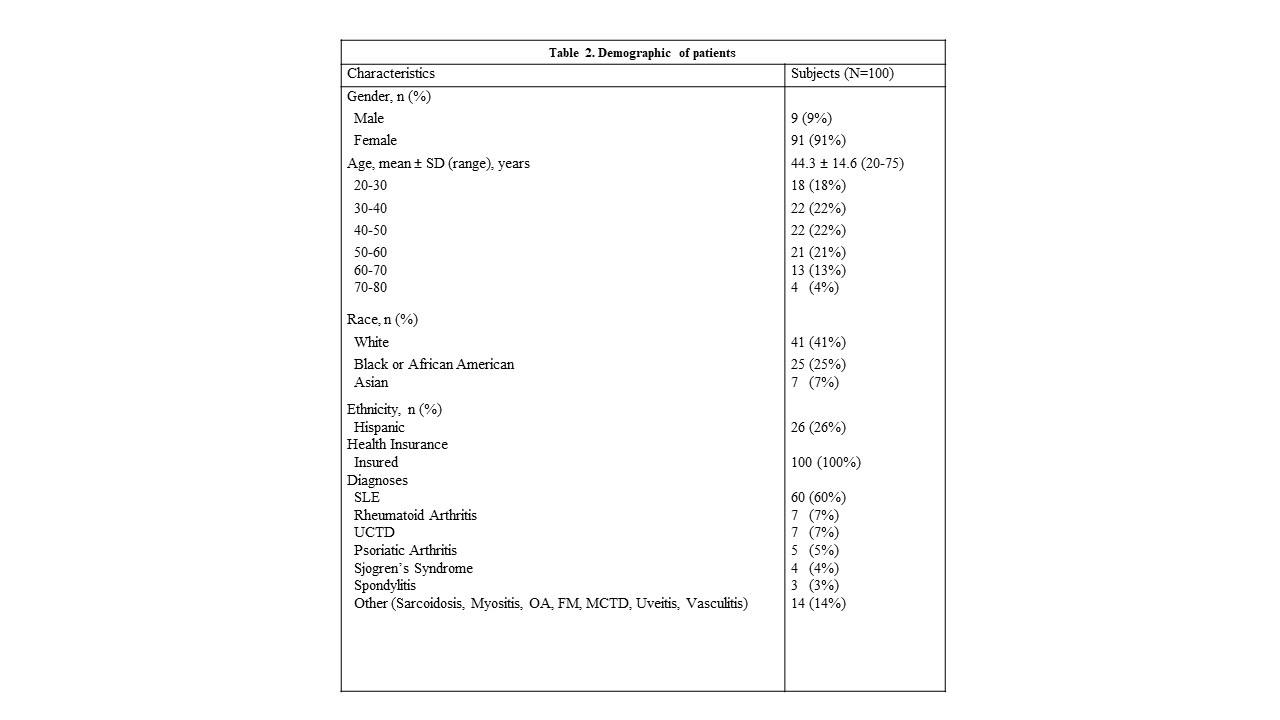Session Information
Session Type: Poster Session B
Session Time: 9:00AM-11:00AM
Background/Purpose: The face of medicine is changing with the time. A twenty-first century technological revolution in medicine happened in March 2020 as the COVID-19 pandemic reached the US. As it quickly became clear that face-to-face clinical medicine could not continue, at least not for some time, medical practices across the country were forced to offer virtual medicine encounters to the vast majority of patients. This change, while protecting patients, also had a cost that we are still trying to ameliorate. In Rheumatology, and other cognitive specialties, the physical exam is a critical component of the evaluation of patients with rheumatic diseases and the ability of current technology to allow for accurate evaluations are limited. As we are struggling to understand the correct balance between face-to-face and telemedicine over the next several months, we sought to evaluate patients’ satisfaction with telemedicine in a New York City rheumatology practice.
Methods: Questionnaires asking about the level of satisfaction with their telemedicine experience were offered to patients that had had a recent telemedicine encounter. The questionnaires asked about their experience and satisfaction with telemedicine and communication with the provider. The abstract reports these responses.
Results: Of the 100 patients, 91% were women, mean age 44.3, 25% black, 26% Hispanic, all insured, and over 90% had a diagnosis of SLE or other types of inflammatory arthritis (RA, UCTD, SS, PsA, SpA). Patients were asked how satisfied they were with telemedicine, and the results were unexpected: 84% reported high levels of satisfaction (highly satisfied or satisfied) with only 5% reporting that they were not satisfied. 86% of patients reported that they were comfortable with the new format. In 92% of patient reports, physicians were able to satisfactorily address the issues and concerns that prompted the visit. 57% of patients reported that the experiences were very similar to the in person experiences. Finally, when asked whether they would use telemedicine in the future, 77% of patients responded “yes”. See further details in the table below. None of the demographic variables correlated with satisfaction or comfort with telemedicine visits.
Conclusion: These data support a high level of patient satisfaction and comfort with telemedicine, suggesting that the transition from in person medicine to telemedicine has been successful. The balance for each subspecialty between face-to-face, when signs and symptoms need to be elicited, and telemedicine remains to be determined. Further data that comprise wider demographics, socio-economics, disease manifestations, and insurance are needed to fully understand the impact of telemedicine on patient care in Rheumatology practices.
To cite this abstract in AMA style:
Chen T, Guo C, Tang W, Khalili L, Askanase A. High Satisfaction with Tele-medicine in a New York City Clinic [abstract]. Arthritis Rheumatol. 2020; 72 (suppl 10). https://acrabstracts.org/abstract/high-satisfaction-with-tele-medicine-in-a-new-york-city-clinic/. Accessed .« Back to ACR Convergence 2020
ACR Meeting Abstracts - https://acrabstracts.org/abstract/high-satisfaction-with-tele-medicine-in-a-new-york-city-clinic/


